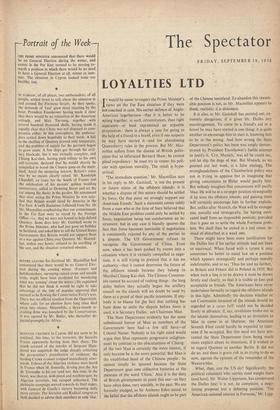Portrait of the Week
THE PRIME MINISTER announced that there would be no General Election during the winter, and events in the Far East seemed to be moving to- wards a position in which there would be no need to have a General Election at all, winter or sum- mer. The situation in Cyprus looked none too healthy, too.
IN WARSAW, of all places, two ambassadors, of all people, settled down to talk about the situation in and around the Formosa Straits. As they spoke, the demands of `face' grew more exacting by the hour, President -Eisenhower having made it clear that there would be no relaxation of the'American attitude, and Mao Tse-tung, together with several hundred thousand shells, having made it equally clear that China was not disposed to com- promise either. In this atmosphere, thc ambassa- dors settled down hopefully to their work. A lull in the shelling of Quemoy proved only temporary. and the problem of supply for the garrison began to grow acute. A few ships got through the artil- lery blockade, but it was virtually complete, and Chiang Kai-shek, having paid tribute to his own self-restraint, declared that he would shortly be compelled to bomb the Chinese guns on the main- land. Amid the mounting tension, Britain's voice was by no means clearly raised. Mr. Randolph Churchill, en route for the South of France and the celebration of his parents' golden wedding anniversary, called at Downing Street and set the cat among the ducks in the garden. He announced that after seeing the Prime Minister he was satis- fied that Britain would stand by America in the Far East. A swift disclaimer followed frOm No. 10, Mr. Macmillan emphasising that our commitments in the Far East were as stated by the Foreign Office—i.e., that we were not bound to help defend Quemoy. Some days later Mr. Gaitskell wrote to the Prime Minister, who had just gone on holiday in Scotland, and asked him to tell the United States Government that Britain would not support them in a war against China over Quemoy. Mr. Macmil- lan, within two hours, refused to do anything of the sort, and the situation remained obscure.
*
BEFORE LEAVING for Scotland Mr. Macmillan had announced that there would be no General Elec- tion during the coming winter. (Farmers and holidaymakers, surveying ruined crops and seaside visits, might have been pardoned for wondering what was 'coming' about the winter.) He explained that he did hot think it would be right to take advantage of the tide of popular approval that seemed to be flowing the Conservative Party's way. There was no official reaction from the Opposition. whose calls for an election have long since died away into silence. Meanwhile, a tree-month re- cruiting drive was launched by the Conservatives. It was opened by Mr. Butler, who thereafter de- ported promptly for Africa.
*
RENEWED VIOLENCE in Cyprus did not seem to be confined, this time, to the terrorists, the Security Forces apparently having done their share. The youth accused of the murder of Sergeant Ham- mond was acquitted, the judge sharply criticising the prosecution's presehtation of evidence; the leading Crown counsel resigned immediately after- wards. Echoes of the Algerian violence were heard in France when M. Soustelle, driving past the Arc de THomphe in his car (and not, this timc, in the boot), was shot at, with pistol and machine-gun, by Algerian terrorists, but escaped unharmed. The plebiscite campaign moved towards its final stages, with General de Gaulle's victory becoming daily more certain. The Socialist and Radical congresxs both decided to advise their members to vote 'Oui.'


































 Previous page
Previous page